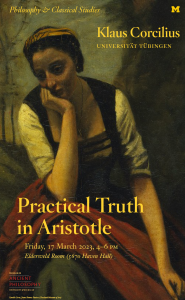
Abstract: "Practical Truth in Aristotle"
This paper offers a new interpretation of Aristotle’s account of practical truth as the agreement of “true practical reasoning” with “right desire". Four questions are posed: What is right desire? In which way can thinking that a particular thing or course of action is good be true? How can right desire and practical reasoning agree on the same object? Why does Aristotle speak of practical truth in the first place? The answers will situate Aristotle’s account of practical truth in his general teleology of the practical.
The main philosophical claims are the following: (i) practical rationality, like all rationality for Aristotle, is fundamentally concerned with principles; (ii) practical truth is the conscious pursuit of a particular course of action as agreeing with the pursuit of an appropriate value in a given situation as that value’s appropriate embodiment. (iii) Aristotle conceptualises this embodiment as a kind of identity. (iv) Practical truth is the best result and achievement (ergon) of episodes of practical reasoning; however, it is neither the essence of practical rationality, nor otherwise a guiding concept in the architecture of Aristotle's philosophy of human affairs.”
This paper offers a new interpretation of Aristotle’s account of practical truth as the agreement of “true practical reasoning” with “right desire". Four questions are posed: What is right desire? In which way can thinking that a particular thing or course of action is good be true? How can right desire and practical reasoning agree on the same object? Why does Aristotle speak of practical truth in the first place? The answers will situate Aristotle’s account of practical truth in his general teleology of the practical.
The main philosophical claims are the following: (i) practical rationality, like all rationality for Aristotle, is fundamentally concerned with principles; (ii) practical truth is the conscious pursuit of a particular course of action as agreeing with the pursuit of an appropriate value in a given situation as that value’s appropriate embodiment. (iii) Aristotle conceptualises this embodiment as a kind of identity. (iv) Practical truth is the best result and achievement (ergon) of episodes of practical reasoning; however, it is neither the essence of practical rationality, nor otherwise a guiding concept in the architecture of Aristotle's philosophy of human affairs.”